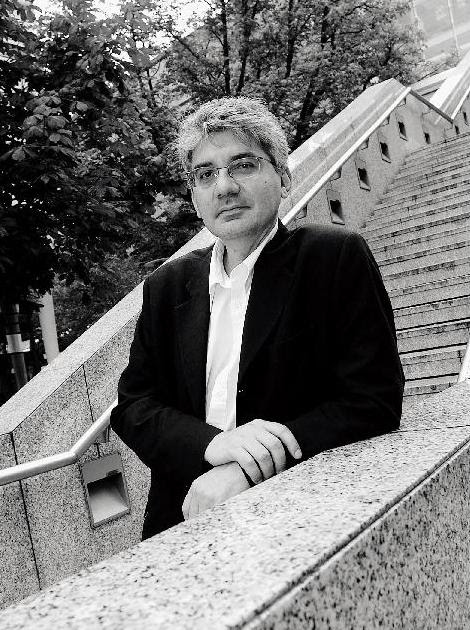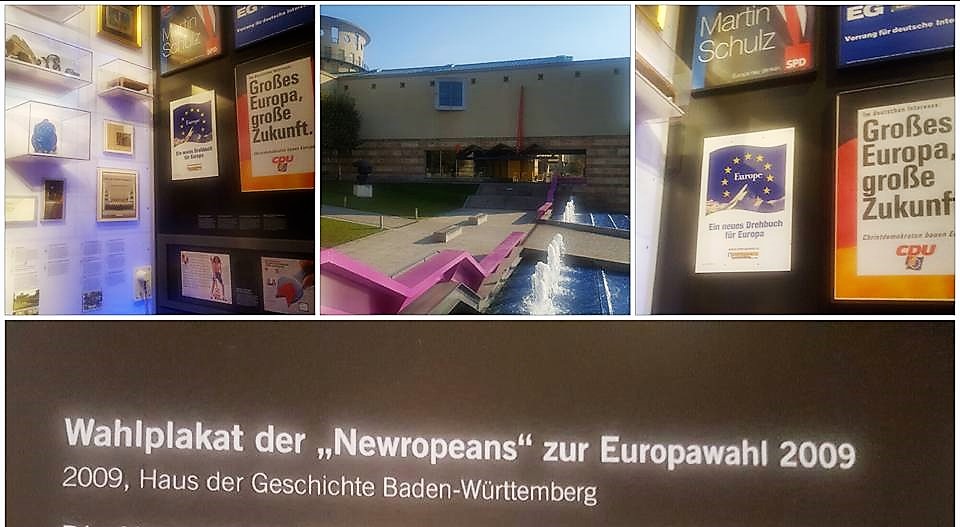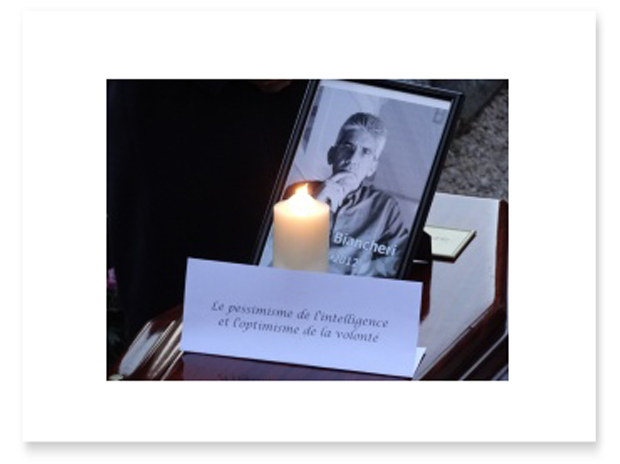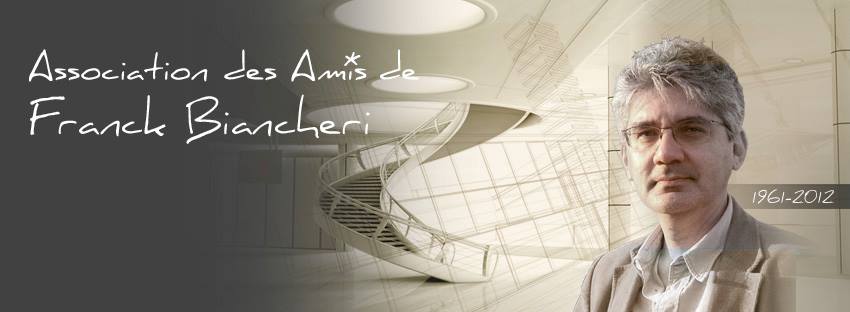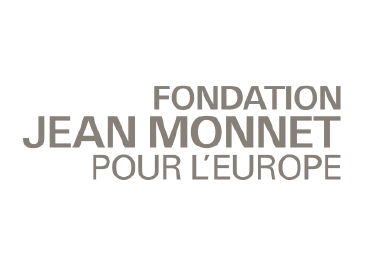[dropcap]T[/dropcap]he House of History (Haus der Geschichte), the museum of history of Baden-Württemberg in Stuttgart, recently opened a new permanent exhibition called „Haus Europa“ (House Europe).
This permanent exhibition deals with the following themes: Slaughterhouse Europe, Euro-Visions, the Europe of Monarchs, Politicians and technocrats, Europe as Common Market and Europe of the Citizens.
Part of this is a documentation of the European Parliament election in 2009 in which Newropeans took part. The exhibition presents one of the campaign posters of Newropeans with a sign that reads:
 “Die Newropeans kritisieren das Fehlen von länderübergreifenden europäischen Parteien und einer europäischen Öffentlichkeit. Sie versuchen daher, Netzwerke zwischen den Bürgern Europas zu knüpfen und traten bei der Europawahl 2009 in Deutschland, Frankreich und den Niederlanden als “europäische Partei” an. Ihre zentrale Forderung ist die Demokratisierung der EU: die Rechte des Europaparlaments sollen gestärkt und die EU-Kommission durch eine europäische Regierung ersetzt werden.”
“Die Newropeans kritisieren das Fehlen von länderübergreifenden europäischen Parteien und einer europäischen Öffentlichkeit. Sie versuchen daher, Netzwerke zwischen den Bürgern Europas zu knüpfen und traten bei der Europawahl 2009 in Deutschland, Frankreich und den Niederlanden als “europäische Partei” an. Ihre zentrale Forderung ist die Demokratisierung der EU: die Rechte des Europaparlaments sollen gestärkt und die EU-Kommission durch eine europäische Regierung ersetzt werden.”
In English: “The Newropeans criticize the lack of transnational European parties and of a European public. They are therefore trying to establish networks between the citizens of Europe and took part in the European elections of 2009 in Germany, France and the Netherlands as a “European party”. Their central objective is the democratization of the EU: the rights of the European Parliament should be strengthened and the European Commission should be replaced by a European government.“
Credit has to be given to Franck Biancheri, who was the founder of Newropeans.
Europe of the Citizens, Euro-Vision, Democracy... are intrinsically linked to Newropeans and above all to Franck Biancheri who rightly deserves to figure in such a place of memory and history.
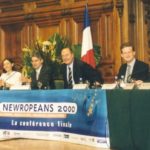 In October 2000, in order to celebrate the emerging of new generations of Europeans born after the Treaty of Rome, and contribute to invent tomorrow’s Europe, Franck Biancheri, prominent founding father of the Erasmus programme, in partnership with other organisations including AEGEE-Europe (that he had launched in 1985), organised a congress entitled “Newropeans 2000 – New Europe, New challenges, New generations” which gathered 2,000 young Europeans together with many heads of states and governments, ministers and European commissioners. This Congress gave its name first to a citizen organization which then became a political party in 2005: Newropeans.
In October 2000, in order to celebrate the emerging of new generations of Europeans born after the Treaty of Rome, and contribute to invent tomorrow’s Europe, Franck Biancheri, prominent founding father of the Erasmus programme, in partnership with other organisations including AEGEE-Europe (that he had launched in 1985), organised a congress entitled “Newropeans 2000 – New Europe, New challenges, New generations” which gathered 2,000 young Europeans together with many heads of states and governments, ministers and European commissioners. This Congress gave its name first to a citizen organization which then became a political party in 2005: Newropeans.
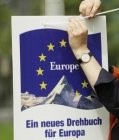 Fifty-three years after the Treaty of Rome was signed, at a time when the entire public life has become trans-European (currency, public services, circulation of goods and people, companies…), political affairs remain in the hands of national parties! It is in order address this absurdity and major danger for our democracies that Franck Biancheri with his road-companions decided to run with Newropeans – with no money and no media support – for the 2009 European election in three different EU countries: France, the Netherlands and Germany.
Fifty-three years after the Treaty of Rome was signed, at a time when the entire public life has become trans-European (currency, public services, circulation of goods and people, companies…), political affairs remain in the hands of national parties! It is in order address this absurdity and major danger for our democracies that Franck Biancheri with his road-companions decided to run with Newropeans – with no money and no media support – for the 2009 European election in three different EU countries: France, the Netherlands and Germany.
Franck Biancheri passed away aged 51 on October 30th, 2012, from a long illness he fought with as much courage and determination as he had fought the schlerosis of Europe’s political life all along his life. His willfulness gave him hope in men’s capacity to overcome History.
The Friends of Franck Biancheri are proud that the legacy Franck Biancheri has left behind is now officially recognized in the History museum of a large city in Germany and thank the museum of history of Baden-Württemberg in Stuttgart for that.
The citizens of Europe of today and tomorrow owe him that.
Information check on the website of the museum: Haus der Geschichte Stuttgart: Haus Europa
Newropeans on the net: newropeansclub.eu
Books by Franck Biancheri:
- “The emergence of eurocitizens” Editions Anticipolis
- “Vision Europe 2020: Reinventing Europe 2005-2020” LEAP/Europe2020
- “World crisis, the path to the world afterwards” Editions Anticipolis
Website dedicated to his work: Franck Biancheri Documentation
The Friends of Franck Biancheri, AAFB
[divider]
![]() copyright/tous droits réservés AAFB2016
copyright/tous droits réservés AAFB2016
[dropcap]L[/dropcap]a Maison de l’Histoire (Haus der Geschichte), le musée de l’histoire du Baden-Württemberg à Stuttgart, a inauguré récemment une exposition permanente intitulée „Haus Europa” (Maison Europe).
Cette exposition permanente aborde notamment les thèmes de “l’Europe, maison de la torture”, “Euro-Visions”, “l’Europe des Monarchies”, “Politiciens et Technocrates”, “l’Europe du marché commun” et “l’Europe des citoyens”…
Entre autres documents sur les élections au Parlement européen, affiches de campagne des différents partis politiques, on y trouve une affiche de la campagne Newropeans pour les élections européennes de 2009 auxquelles le mouvement a pris part, avec la description la suivante :
 “Die Newropeans kritisieren das Fehlen von länderübergreifenden europäischen Parteien und einer europäischen Öffentlichkeit. Sie versuchen daher, Netzwerke zwischen den Bürgern Europas zu knüpfen und traten bei der Europawahl 2009 in Deutschland, Frankreich und den Niederlanden als “europäische Partei” an. Ihre zentrale Forderung ist die Demokratisierung der EU: die Rechte des Europaparlaments sollen gestärkt und die EU-Kommission durch eine europäische Regierung ersetzt werden.”
“Die Newropeans kritisieren das Fehlen von länderübergreifenden europäischen Parteien und einer europäischen Öffentlichkeit. Sie versuchen daher, Netzwerke zwischen den Bürgern Europas zu knüpfen und traten bei der Europawahl 2009 in Deutschland, Frankreich und den Niederlanden als “europäische Partei” an. Ihre zentrale Forderung ist die Demokratisierung der EU: die Rechte des Europaparlaments sollen gestärkt und die EU-Kommission durch eine europäische Regierung ersetzt werden.”
En français: “Les Newropeans critiquent l’absence de partis politiques trans-européens et d’une opinion publique européenne. Ils essaient de ce fait de mettre en réseau les citoyens de l’Europe et ils ont participé aux élections européennes de 2009 en Allemagne, France et aux Pays-Bas comme un “parti européen”. Leur objectif central est la démocratisation de l’UE: le renforcement des droits du Parlement européen et le remplacement de la commission européenne par un gouvernement européen.”
Tout le mérite en revient à Franck Biancheri, fondateur de Newropeans.
L’Europe des citoyens, Euro-Vision, Démocratie… sont intrinsèquement liés à Newropeans mais surtout à Franck Biancheri qui mérite bien de figurer dans un tel lieu de mémoire et d’histoire.
 En Octobre 2000, pour marquer l’arrivée de nouvelles générations d’Européens nées après le Traité de Rome et contribuer à imaginer l’Europe de demain, Franck Biancheri, l’un des pères du programme Erasmus, en partenariat avec d’autres organisations dont AEGEE-Europe (qu’il avait fondé en 1985), organise le congrès “Newropeans 2000 – Nouvelle Europe, Nouveaux Défis, Nouvelles Générations” qui réunit près de 2.000 jeunes Européens ainsi que de nombreux chefs d’Etat, de gouvernement, ministres et commissaires européens. Ce congrès donnera son nom à une organisation citoyenne d’abord puis à ce qui devient le parti politique en 2005: Newropeans.
En Octobre 2000, pour marquer l’arrivée de nouvelles générations d’Européens nées après le Traité de Rome et contribuer à imaginer l’Europe de demain, Franck Biancheri, l’un des pères du programme Erasmus, en partenariat avec d’autres organisations dont AEGEE-Europe (qu’il avait fondé en 1985), organise le congrès “Newropeans 2000 – Nouvelle Europe, Nouveaux Défis, Nouvelles Générations” qui réunit près de 2.000 jeunes Européens ainsi que de nombreux chefs d’Etat, de gouvernement, ministres et commissaires européens. Ce congrès donnera son nom à une organisation citoyenne d’abord puis à ce qui devient le parti politique en 2005: Newropeans.
 En effet, cinquante-trois ans après la signature du Traité de Rome, alors que toute la vie publique est devenue trans-européenne (monnaie, services publics, circulation des biens et des personnes, entreprises…), la politique est restée aux mains des partis nationaux. C’est à cette aberration et à ce danger majeur pour nos démocraties que Franck Biancheri et ses compagnons de route décidèrent de répondre en présentant Newropeans – sans argent et sans médiatisation – pour la première fois aux élections européennes de 2009 dans 3 pays : France, Pays-Bas et Allemagne.
En effet, cinquante-trois ans après la signature du Traité de Rome, alors que toute la vie publique est devenue trans-européenne (monnaie, services publics, circulation des biens et des personnes, entreprises…), la politique est restée aux mains des partis nationaux. C’est à cette aberration et à ce danger majeur pour nos démocraties que Franck Biancheri et ses compagnons de route décidèrent de répondre en présentant Newropeans – sans argent et sans médiatisation – pour la première fois aux élections européennes de 2009 dans 3 pays : France, Pays-Bas et Allemagne.
Franck Biancheri est décédé à 51 ans, le 30 octobre 2012 à Paris, des suites d’une longue maladie contre laquelle il a combattu avec autant de courage et d’opiniâtreté que ce qu’il a investi dans sa lutte contre la sclérose du monde politique en Europe. Une volonté qui le poussait à être optimiste dans la capacité des hommes à dépasser l’Histoire.
L’association des Amis de Franck Biancheri est très fière et remercie le musée de l’histoire du Baden-Württemberg à Stuttgart pour cette reconnaissance officielle de l’héritage que Franck Biancheri a laissé derrière lui et que sa mémoire soit ainsi portée par les citoyens.
Les citoyens européens d’aujourd’hui et de demain lui doivent au moins cela.
Pour plus d’informations sur le site du musée: Haus der Geschichte Stuttgart: Haus Europa
Newropeans sur le net: newropeansclub.eu
Livres écrit par Franck Biancheri:
- “L’émergence des euro-citoyens” Editions Anticipolis
- “Vision Europe 2020: Reinventing Europe 2005-2020” LEAP/Europe2020
- “Crise mondiale – En route pour le monde d’après” Editions Anticipolis
Site dédié à son oeuvre: Franck Biancheri Documentation
L’association des Amis de Franck Biancheri, AAFB
[divider]
